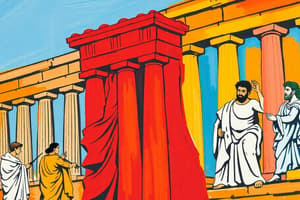Podcast
Questions and Answers
Who is known as 'The Father of Democracy'?
Who is known as 'The Father of Democracy'?
- Aristotle
- Cleisthenes (correct)
- Herodotus
- Pericles
All citizens of Ancient Greece were allowed to vote in the Athenian democracy.
All citizens of Ancient Greece were allowed to vote in the Athenian democracy.
False (B)
What system of government did Cleisthenes introduce in 507 B.C.?
What system of government did Cleisthenes introduce in 507 B.C.?
Demokratia
The Athenian democracy was comprised of the ekklesia, the boule, and the __________.
The Athenian democracy was comprised of the ekklesia, the boule, and the __________.
Match the following Athenian institutions with their functions:
Match the following Athenian institutions with their functions:
In the middle of the 4th century, how many male citizens were part of the demos?
In the middle of the 4th century, how many male citizens were part of the demos?
The meetings of the ekklesia were held annually on the Pnyx.
The meetings of the ekklesia were held annually on the Pnyx.
What term refers to resident foreigners in Ancient Athens?
What term refers to resident foreigners in Ancient Athens?
What was one of the main functions of the boule?
What was one of the main functions of the boule?
The ekklesia met every day to vote on important issues.
The ekklesia met every day to vote on important issues.
What power did the ekklesia have related to citizens?
What power did the ekklesia have related to citizens?
The popular courts in Athens were known as __________.
The popular courts in Athens were known as __________.
Match the following terms with their descriptions:
Match the following terms with their descriptions:
How were positions in the boule chosen?
How were positions in the boule chosen?
Jurors in the dikasteria were unpaid and served voluntarily.
Jurors in the dikasteria were unpaid and served voluntarily.
What was Aristotle's view on the dikasteria's contribution to democracy?
What was Aristotle's view on the dikasteria's contribution to democracy?
Flashcards are hidden until you start studying
Study Notes
Athenian Democracy
- Cleisthenes, "The Father of Democracy," introduced the concept of demokratia or "rule by the people" in 507 B.C.
- The Athenian system of direct democracy involved three institutions: the ekklesia, the boule, and the dikasteria.
- Athenian citizenship was restricted to men and women whose parents were Athenian citizens.
- The male population of Athens in the 4th century B.C. was about 100,000.
- Athenian democracy only allowed male citizens over the age of 18 to vote, resulting in around 40,000 people participating in the system.
The Ekklesia
- The ekklesia, or Assembly, was the main governing body of Athens with meetings held 40 times per year.
- Meetings were held at the Pnyx, a hillside auditorium west of the Acropolis.
- Any Athenian male citizen could attend, but only about 5,000 attended each session.
- The ekklesia had the power to:
- Decide on war and foreign policy
- Write and revise laws
- Approve or condemn the conduct of public officials
- Ostracize citizens by a majority vote
- Decisions were made by simple majority vote.
- While the ekklesia was technically open to all Athenian citizens, only 5,000 men attended each session, as the rest served in the military or worked.
The Boule
- The boule, or Council of Five Hundred, was a group of 500 men, 50 from each of the ten Athenian tribes.
- Members served on the Council for one year.
- The boule met every day and was responsible for daily governance.
- The boule:
- Supervised government workers
- Managed navy ships and army horses
- Dealt with ambassadors from other city-states
- Determined which matters would come before the ekklesia
- Positions on the boule were chosen by lot, aiming for a more democratic system.
- Although selection was theoretically random, historians argue that wealthy and influential people were overrepresented on the Council.
The Dikasteria
- The dikasteria, or popular courts, used a system of juries chosen by lot from male citizens over 30.
- Aristotle deemed the dikasteria the strongest pillar of Athenian democracy because of its immense power.
- Over 500 jurors were chosen daily.
- The dikasteria:
- Served as the judicial system since there were no police in Athens.
- Judged cases based on the argument of the prosecution and defense.
- Delivered verdicts and sentences by the majority rule.
- Had no limitations on the types of cases that could be prosecuted.
- Citizens could use the dikasteria to punish or embarrass their enemies.
- Jurors received a wage, allowing participation beyond the wealthy.
Studying That Suits You
Use AI to generate personalized quizzes and flashcards to suit your learning preferences.




